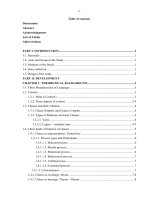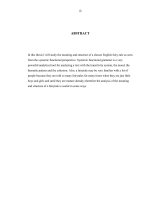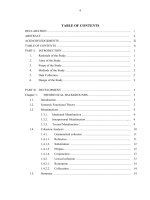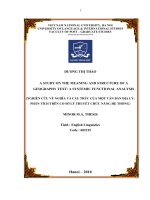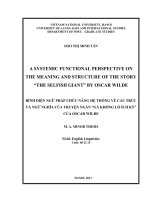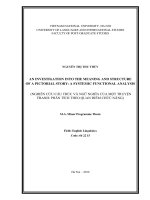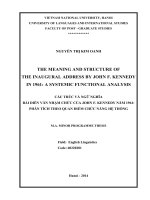The meaning and structure of an american short story a systemic functional analysis
Bạn đang xem bản rút gọn của tài liệu. Xem và tải ngay bản đầy đủ của tài liệu tại đây (1.33 MB, 5 trang )
The meaning and structure
of an american short story: a systemic functional
analysis
Nguyễn Thị Mến
Trường Đại học Ngoại Ngữ
Luận văn ThS. Chuyên ngành: English Linguistic; Mã Số: 60 22 15
Người hướng dẫn: Prof. Dr.Nguyễn Văn Độ
Năm bảo vệ: 2010
Abstract: In the present study, an attempt is made to explore the grammar and meaning of the
short story “Witches’ Loaves” by O’Henry as a text which is taken from “O’Henry’s short
stories online”. The procedures and conventions used in the analysis are based on the framework
of Halliday’s (1994) An Introduction to Functional Grammar. The analysis of the text will
proceed from the topic of the chosen text; clauses and clause complex analysis; the transitivity
pattern, the mood pattern, the theme-rheme pattern, the grammatical and lexical cohesion; to a
summary of the context of situation of the text in terms of the three contextual parameters: field,
tenor, and mode.
Keywords: Tiếng Anh; Cấu trúc; Ngữ nghĩa; Truyện ngắn
Content:
iv
Table of contents
Declaration
Abstract
Acknowledgments
List of Tables
Abbreviations
PART I: INTRODUCTION 1
1.1. Rationale 1
1.2. Aims and Scope of the Study 1
1.3. Methods of the Study 1
1.4. Data collection 1
1.5. Design of the study…………………… 2
PART II: DEVELOPMENT
CHAPTER 1: THEORETICAL BACKGROUND 3
1.1. Three Metafunctions of Language………………… 3
1.2. Context……………………………………………………… 3
1.2.1. What is Context? 3
1.2.2. Three aspects of context………………… 3-4
1.3. Clauses and their relations 4
1.3.1. Clause Simplex and Clause Complex 4
1.3.2. Types of Relations between Clauses……… 4
1.3.2.1. Taxis 4
1.3.2.2. Logico – semantic type .4-5
1.4. Three kinds of function of clauses 5
1.4.1. Clause as representation: Transitivity 6
1.4.1.1. Process types and Participants .6
1.4.1.1.1. Material process 6
1.4.1.1.2. Mental process 6
1.4.1.1.3. Relational process 6
1.4.1.1.4. Behavioural process 7
1.4.1.1.5. Verbal process 7
1.4.1.1.6. Existential process 7
1.4.1.2. Circumstances 7
1.4.2. Clause as exchange: Mood 7-8
1.4.3. Clause as message: Theme – Rheme………… 8
v
1.5. Cohesion 8
1.5.1. Grammatical Cohesion 8
1.5.1.1. Reference…………… 8-9
1.5.1.2. Substitution 9
1.5.1.3. Ellipsis 9
1.5.2. Logical Cohesion 10
1.5.2.1. Adversative 10
1.5.2.2. Additive 10
1.5.2.3. Causal 10
1.5.2.4. Temporal 10
1.5.3. Lexical Cohesion 10
1.5.3.1. Reiteration………………………… 10-11
1.5.3.2. Collocation 11
1.6. Summary 11
CHAPTER 2: THE MEANING AND STRUCTURE OF THE TEXT “WITCHES’S
LOAVES” 12
2.1. The Chosen Text 12
2.2. Clauses and Clause Complex Analysis 132
2.3. The Analysis of the Text in Terms of Transitivity, Mood and Theme…… 12- 28
2.3.1. The Transitivity Pattern of the Text……………… 28-29
2.3.2. The Mood Pattern of the Text……………… 29
2.3.3. The Thematic Pattern of the Text 29
2.4. The Cohesion of the Text 30
2.4.1. Grammatical Cohesion 30-31
2.4.1.1. Reference…………………………… 31
2.4.1.2. Conjunctive Devices………… 41
2.4.2. Lexical Cohesion………………… 41
2.5. Contextual Configuration of the Text………………… 43
2.6. Summary 43
PART 3: CONCLUSION 44
1.1. Recapitulation 44
1.2. Contributions 44
1.3 Implications of the study 44
1.4. Suggestions for future research 44
REFERENCES
APPENDICE
1
PART 1
INTRODUCTION
1.1. Rationale
According to Halliday (1994), the fundamental difference between systemic
functional grammar and formal models of grammar is that the former is based on a
functional framework. It is functional in three closely related senses: in its interpretation
of text, of system, and of the elements of linguistic structures. Functional grammar sees
language first and foremost as a system of communication and analyzes grammar to
discover how it is organized to allow speakers and writers to make any exchange
meanings. Rather than insisting on a clear distinction between grammatical and
ungrammatical forms, the focus is usually on the appropriateness of a form for a
particular communicative purpose in a particular context. The primary concern is with the
functions of structures and their constituents and with their meanings in context. A
grammarian interested in this kind of description is likely to use data from authentic texts
in specific contexts.
My reason for choosing to analyse a short story by O’Henry is first and foremost due
to my strong favourite for American short stories, especially, O.Henry’s ones. Therefore, I
would like to have a deep understanding of my beloved short stories, one of which is the
short story “Witches’ loaves” by O’Henry. I myself find that functional grammar with the
systemic functional analysis method is a very useful tool and an effective method to help me
understand the story further in terms of both meaning and structure.
1.2. Aims and Scope of the Study
Within the framework of a minor thesis, the aim of the study is to:
Examine some basic analytical aspects included by systemic functional
linguistics such as experiential, interpersonal and textual ones.
Investigate how these aspects are employed in the short story “The Witches’
Loaves” by O’Henry.
Offer some suggestions for teaching and learning.
The research question that the present study seeks to answer is: “How is the text
expressed in terms of transitivity, mood and theme-rheme?”
This study does not attempt to cover all aspects of functional grammar but some main
areas of systemic functional theory and primary concepts such as linguistic system,
metafunctions and cohesion. The focus is on some issues relating to the analysis of the text.
2
My original writing of the thesis was based on the format and methods employed in the
previous M.A Theses in the same file supervised by Prof. Dr. Hoang Van Van such as: The
meaning and Structure of a Biology text: a systemic functional analysis by Ho Thi Mai
(2008); The meaning and structure of a fairy tale story: a systemic functional analysis by
Pham Thi Thuy and a research on The meaning and Structure of a Science Fiction Story: a
systemic functional analysis. Journal of Science (Foreign Languages) by Prof. Dr. Hoang
Van Van. However; according to the comments given by the Board of Examiners, my M.A
thesis has been changed in some parts mainly in “Development” and “Appendix”. I quite
hope that such adjustments are reasonable and satisfactory.
1.3. Methods of the Study
The study is undertaken with a view to analyzing the meaning and grammar of a
short story. The descriptive and analytical methods will be applied as the principal ones.
The descriptive method is concerned with the description of concepts related to systemic
functional grammar. The analytical method is resorted to analyze the chosen text. The
procedures and conventions used in the analysis are based on the framework of
Halliday’s (1994) An Introduction to Functional Grammar.
1.4. Data collection
The text is a short story – a literature text taken from “O’Henry short stories online”.
1.5. Design of the study
The minor thesis is divided into four chapters as following:
- Chapter I – Introduction: Introduces the rational, aims, scope, methods of the study,
data collection and the research design.
- Chapter II – Theoretical Background: provides the theoretical background of the
study. Its focus is on introducing important concepts in systemic functional linguistics
relevant to the topic of the thesis.
- Chapter III – The analysis of the short story “Witches’ Loaves”: focuses on the
meaning and structure of the text.
- Chapter IV – The conclusion: summarizes the results of the study and suggests
some implications for teaching and learning English as well as presents the
suggestions for further research.



